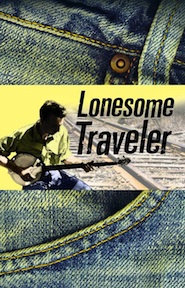EXCELLENCE VS. HOKUM
With Lonesome Traveler, a compendium of the golden years of American folk music, writer/director James O’Neil has developed a long-winded and incoherent revue that is more appropriate for a pledge drive on PBS than a stage. Almost 50 songs are beautifully warbled (at least 36 in their entirety!) by a multi-talented, incomparable cast in this 2 hour and 40 minute revue, but there’s no mortar to hold the bricks together. Traveler may be winding up its run at the Laguna Playhouse (it began at the Rubicon in Ventura), but based on some of the astounding interpretations of songs covering 40 years of folk, I pray that O’Neil takes this back to the drawing board with a different writer (or at least a different perspective).
Compilation shows of a composer or genre can be perfidiously challenging to execute. One song after another after another after another can induce tedium, regardless of how pleasurable the ditties might be independently. Ain’t Misbehavin’ (1978), one of the first revue-style rundowns to become a runaway hit, was in many ways the genesis of the jukebox musical, but scant revues since have achieved that same level of success. The collection of Fats Waller hits was a joyous smash because it employed performers that growled with rough authenticity and managed to capture the spirit of his era.
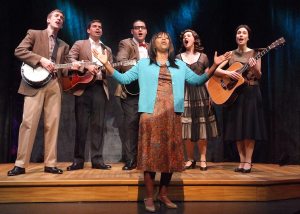 Not so with Lonesome Traveler, which uses peerless performers (such as powerhouse Jennifer Leigh Warren), to annotate the work of folk creators, confounding us as they consistently assume different guises and bounce back and forth between eras. O’Neil even goes so far as to assign his voices from the past to speak in present vernacular: “As y’all would say, the song went viral.”
Not so with Lonesome Traveler, which uses peerless performers (such as powerhouse Jennifer Leigh Warren), to annotate the work of folk creators, confounding us as they consistently assume different guises and bounce back and forth between eras. O’Neil even goes so far as to assign his voices from the past to speak in present vernacular: “As y’all would say, the song went viral.”
The sappy conceit is that narrator Justin Flagg, aka “The Lonesome Traveler,” is not a flesh-and-blood character, but some sort of embodiment of folk music as a whole. Warren herself starts off as “The Muse,” an old, hunched-over, black woman who sings a spiritual from her porch in 1926, and then encourages Mr. Traveler to transform her songs into folk music with: “You tell ’˜em, Lonesome!”
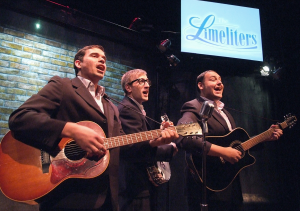 While we have to endure some truly syrupy banter, O’Neil speckles the evening with fascinating tidbits about the social issues that fueled folk, such as unionizing, working classes, and migrants. We also learn the fascinating genesis of some tunes: for example, Woody Guthrie’s “This Land is Your Land” was a rejoinder to Irving Berlin’s uber patriotic “God Bless America.” But these scraps from the table of folk music merely whet our appetite for some kind of narrative to glom onto.
While we have to endure some truly syrupy banter, O’Neil speckles the evening with fascinating tidbits about the social issues that fueled folk, such as unionizing, working classes, and migrants. We also learn the fascinating genesis of some tunes: for example, Woody Guthrie’s “This Land is Your Land” was a rejoinder to Irving Berlin’s uber patriotic “God Bless America.” But these scraps from the table of folk music merely whet our appetite for some kind of narrative to glom onto.
As one who has scoured the Blue Ridge Parkway, I can tell you that stories abound about how spirituals morphed into Appalachia music, which in turn became Country, which then branched into folk (with a generous helping of the blues). But these stories, some of them mighty juicy, are barely touched upon in Lonesome Traveler. Showing us the Carter Family in a studio during the infancy of recordings may look and sound swell, but an examination of the Carter story would have elucidated the evolution of folk music far better than five different songs from other artists.
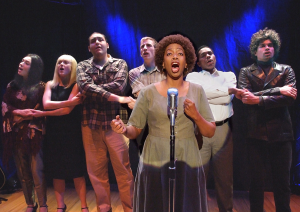 Granted, O’Neil isn’t going for story here. Nor is he imitating the gobs of jukebox musicals out there, wherein a songwriter’s accumulated works are haphazardly inserted into a blockheaded story. Nope, he’s going straight for the warm fuzzies, inviting audience members to sing along in between mawkish recollections and hokey interchanges (“Remember this one?”). Unfortunately, once you invite spectators to sing along, they never shut up, spitting out-of-tune notes and incorrect lyrics on my neck while I’m trying to listen to a professional do it right. Goodnight, “Goodnight, Irene!”
Granted, O’Neil isn’t going for story here. Nor is he imitating the gobs of jukebox musicals out there, wherein a songwriter’s accumulated works are haphazardly inserted into a blockheaded story. Nope, he’s going straight for the warm fuzzies, inviting audience members to sing along in between mawkish recollections and hokey interchanges (“Remember this one?”). Unfortunately, once you invite spectators to sing along, they never shut up, spitting out-of-tune notes and incorrect lyrics on my neck while I’m trying to listen to a professional do it right. Goodnight, “Goodnight, Irene!”
Why then should Mr. O’Neil take this show apart and start over? The songs. The show became mesmerizing and wistful during the second act, when a series of songs was perfectly executed in a coffee house setting (where the songs weren’t interrupted with inane commentary). We were treated to wonderful impersonations of The Kingston Trio, Peter, Paul and Mary and, with surprising effectiveness, Ian & Sylvia covering Gordon Lightfoot’s “Early Morning Rain.” Their rendition was so touching that I was startled when they left the stage – it just feels odd having this duo rock my world and then suddenly depart. (Turns out that Ian & Sylvia came from Toronto to New York and caught the eye of Albert Grossman, who managed Peter, Paul and Mary and would soon take on Bob Dylan. Years later, Ian & Sylvia would be credited with pioneering country-rock before they divorced in 1975.)
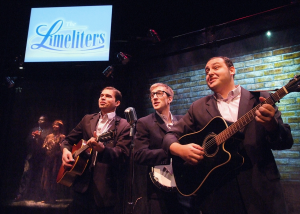 The entire cast consists of holdovers from the Rubicon (except Ms. Warren who, incidentally, blew the roof off the house from Laguna back to Ventura). Justine Bennett (“The Activist”), Sylvie Davidson (“The Lady”), Mr. Flagg (you know, “The Traveler”), Brendan Willing James (“The Poet”), Anthony Manough (“The Man”) and Nicholas Mongiardo-Cooper (“The Preacher”) cannot be celebrated enough for their astounding renditions and superb instrumentals. Associate music director Trevor Wheetman backed up the gang by playing a variety of instruments (he is also the son of music director Dan Wheetman, whose dedication and hard work shines bright). A special nod to James Webb, whose gracious spirit and compassion were evident as he frolicked on the upright bass.
The entire cast consists of holdovers from the Rubicon (except Ms. Warren who, incidentally, blew the roof off the house from Laguna back to Ventura). Justine Bennett (“The Activist”), Sylvie Davidson (“The Lady”), Mr. Flagg (you know, “The Traveler”), Brendan Willing James (“The Poet”), Anthony Manough (“The Man”) and Nicholas Mongiardo-Cooper (“The Preacher”) cannot be celebrated enough for their astounding renditions and superb instrumentals. Associate music director Trevor Wheetman backed up the gang by playing a variety of instruments (he is also the son of music director Dan Wheetman, whose dedication and hard work shines bright). A special nod to James Webb, whose gracious spirit and compassion were evident as he frolicked on the upright bass.
The multimedia display was not used to great effect, but David Mickey did some beautiful work. The technical achievement of the night was the sound design by Jonathan Burke – aided by Jason Tuttle, this duo created a showcase of inventive variety, volume and clarity. This is exactly what was needed in a show where the song was the thing.
And these songs have the power to melt the coldest of hearts, even as the dialogue will surely melt your brain.
photos by Ed Krieger/Laguna Playhouse
Lonesome Traveler
Laguna Playhouse in Orange County
scheduled to end on February 5
for tickets, visit http://www.lagunaplayhouse.com
